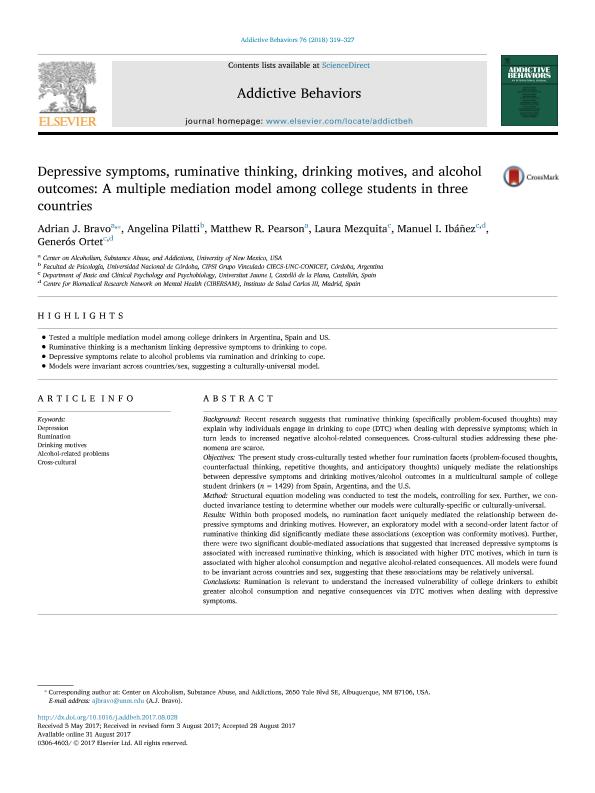Mostrar el registro sencillo del ítem
dc.contributor.author
Bravo, Adrían J.
dc.contributor.author
Pilatti, Angelina

dc.contributor.author
Pearson, Matthew R.
dc.contributor.author
Mezquita, Laura
dc.contributor.author
Ibañez, Manuel I.
dc.contributor.author
Ortet, Generós
dc.date.available
2021-06-04T12:24:34Z
dc.date.issued
2018-01
dc.identifier.citation
Bravo, Adrían J.; Pilatti, Angelina; Pearson, Matthew R.; Mezquita, Laura; Ibañez, Manuel I.; et al.; Depressive symptoms, ruminative thinking, drinking motives, and alcohol outcomes: A multiple mediation model among college students in three countries; Pergamon-Elsevier Science Ltd; Addictive Behaviors.; 76; 1-2018; 319-327
dc.identifier.issn
0306-4603
dc.identifier.uri
http://hdl.handle.net/11336/133194
dc.description.abstract
Recent research suggests that ruminative thinking (specifically problem-focused thoughts) may explain why individuals engage in drinking to cope (DTC) when dealing with depressive symptoms; which in turn leads to increased negative alcohol-related consequences. Cross-cultural studies addressing these phenomena are scarce. Objectives The present study cross-culturally tested whether four rumination facets (problem-focused thoughts, counterfactual thinking, repetitive thoughts, and anticipatory thoughts) uniquely mediate the relationships between depressive symptoms and drinking motives/alcohol outcomes in a multicultural sample of college student drinkers (n = 1429) from Spain, Argentina, and the U.S. Method Structural equation modeling was conducted to test the models, controlling for sex. Further, we conducted invariance testing to determine whether our models were culturally-specific or culturally-universal. Results Within both proposed models, no rumination facet uniquely mediated the relationship between depressive symptoms and drinking motives. However, an exploratory model with a second-order latent factor of ruminative thinking did significantly mediate these associations (exception was conformity motives). Further, there were two significant double-mediated associations that suggested that increased depressive symptoms is associated with increased ruminative thinking, which is associated with higher DTC motives, which in turn is associated with higher alcohol consumption and negative alcohol-related consequences. All models were found to be invariant across countries and sex, suggesting that these associations may be relatively universal. Conclusions Rumination is relevant to understand the increased vulnerability of college drinkers to exhibit greater alcohol consumption and negative consequences via DTC motives when dealing with depressive symptoms.
dc.format
application/pdf
dc.language.iso
eng
dc.publisher
Pergamon-Elsevier Science Ltd

dc.rights
info:eu-repo/semantics/openAccess
dc.rights
Atribución-NoComercial-CompartirIgual 2.5 Argentina (CC BY-NC-SA 2.5 AR)
dc.rights.uri
https://creativecommons.org/licenses/by-nc-sa/2.5/ar/
dc.subject
ALCOHOL-RELATED PROBLEMS
dc.subject
CROSS-CULTURAL
dc.subject
DEPRESSION
dc.subject
DRINKING MOTIVES
dc.subject
RUMINATION
dc.subject.classification
Otras Psicología

dc.subject.classification
Psicología

dc.subject.classification
CIENCIAS SOCIALES

dc.title
Depressive symptoms, ruminative thinking, drinking motives, and alcohol outcomes: A multiple mediation model among college students in three countries
dc.type
info:eu-repo/semantics/article
dc.type
info:ar-repo/semantics/artículo
dc.type
info:eu-repo/semantics/publishedVersion
dc.date.updated
2021-06-02T12:15:02Z
dc.journal.volume
76
dc.journal.pagination
319-327
dc.journal.pais
Estados Unidos

dc.description.fil
Fil: Bravo, Adrían J.. University of New Mexico; Estados Unidos
dc.description.fil
Fil: Pilatti, Angelina. Universidad Nacional de Córdoba. Facultad de Psicología; Argentina. Consejo Nacional de Investigaciones Científicas y Técnicas. Centro Científico Tecnológico Conicet - Córdoba. Centro de Investigaciones y Estudio sobre Cultura y Sociedad. Centro de Investigaciones de la Facultad de Psicología - Grupo Vinculado CIPSI; Argentina
dc.description.fil
Fil: Pearson, Matthew R.. University of New Mexico; Estados Unidos
dc.description.fil
Fil: Mezquita, Laura. Universitat Jaume I; España
dc.description.fil
Fil: Ibañez, Manuel I.. Universitat Jaume I; España
dc.description.fil
Fil: Ortet, Generós. Universitat Jaume I; España
dc.journal.title
Addictive Behaviors.

dc.relation.alternativeid
info:eu-repo/semantics/altIdentifier/url/https://pubmed.ncbi.nlm.nih.gov/28889061/
dc.relation.alternativeid
info:eu-repo/semantics/altIdentifier/url/https://www.sciencedirect.com/science/article/abs/pii/S0306460317303258?via%3Dihub
dc.relation.alternativeid
info:eu-repo/semantics/altIdentifier/doi/http://dx.doi.org/10.1016/j.addbeh.2017.08.028
Archivos asociados
